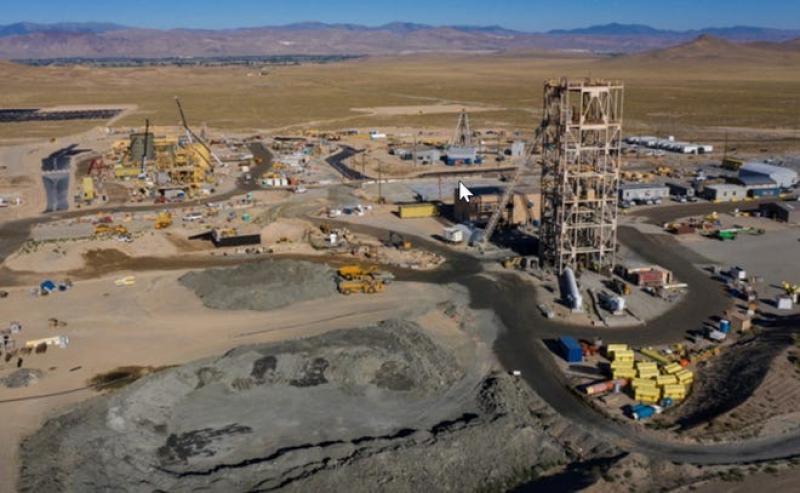To go electric, America needs more mines. Can it build them? | Reuters
Category: News & Politics
Via: larry-hampton • 4 years ago • 13 commentsBy: Ernest Scheyder (U. S.)


Last September, in the arid hills of northern Nevada, a cluster of flowers found nowhere else on earth died mysteriously overnight.

By Ernest Scheyder
(Reuters) - Last September, in the arid hills of northern Nevada, a cluster of flowers found nowhere else on earth died mysteriously overnight.
Conservationists were quick to suspect ioneer Ltd, an Australian firm that wants to mine the lithium that lies beneath the flowers for use in electric vehicle (EV) batteries.
One conservation group alleged in a lawsuit that the flowers, known as Tiehm's buckwheat, were "dug up and destroyed." The rare plant posed a problem for ioneer because U.S. officials may soon add it to the Endangered Species List, which could scuttle the mining project.
Ioneer denies harming the flowers. Their cause of death remains hotly debated - as does the fate of the lithium mine.
The clash of environmental priorities underpinning the battle over Tiehm's buckwheat - conservation vs. green energy - is a microcosm of a much larger political quandary for the new administration of President Joe Biden, who has made big promises to environmentalists as well as labor groups and others who stand to benefit by boosting mining.
To please conservationists, Biden has vowed to set aside at least 30% of U.S. federal land and coastal areas for conservation, triple current levels.
But that aim could conflict with his promises to hasten the electrification of vehicles and to reduce the country's dependence …




By all means, let’s turn this,,,
,,,into this ,,,
,,,dumbasses.
Or turn it into this ...
... which requires this ...
As long as it's N ot I n M y B ack Y ard, it's okay.
There is no reason it has to black or white.
Do we really need to damage so much, do we truly need so much edifice? Is there not a way to exist without destroying/depleting our primary resource?
The way in which humans live should reflect our very real dependence on Nature.
The short answer is yes. At the most basic level every living thing consumes its environment to survive, continue living, and provide for a posterity.
What humans do extends far beyond survival and providing for a posterity. Humans have the capacity to exert control over their innate animal instincts which is a rarity among living things. Humans are ignoring that which separates humans from animals driven by animal instincts and animal urges.
IMO, humans need to engage in more philosophical endeavors than in scientific endeavors. Science only provides greater ability for humans to satisfy their animal instincts and urges while ignoring what makes humans human.
At the most basic level every living thing consumes its environment to survive, continue living, and provide for a posterity.
Yet all other animals contribute, even in their waste, to the cycle of life on the planet. Humans are the only animals that take more than they give to this cycle.
What humans do extends far beyond survival and providing for a posterity. Humans have the capacity to exert control over their innate animal instincts which is a rarity among living things. Humans are ignoring that which separates humans from animals driven by animal instincts and animal urges.
I would argue that ignoring our Natural instincts is what has led humans to be the ONLY species on the planet to disrespect, abuse, and destroy it's environment.
It's the unrestrained GREED of the mining companies that shocks me. They say that extraction is absolutely necessary, and therefore inevitable. From that, they conclude that... they can behave however they want.
So of course, the environmentalists take a stonewall position in reaction. ''You can do NOTHING!!''
Why can it never be managed intelligently?
Can't the flowers be moved elsewhere, for example? We have all these intelligent people, being stubborn rather than working together.
It's infuriating!
As far as moving the plants, that is being researched. It appears these incredibly rare plants exist in like a twenty acre area, produced by an equally unique soil composition.
This case is a tough one.
In our society, that translates as ''This case is an expensive one.''
The extractors can pay.
I can't argue with that!
The controversy continues....
“We noticed that quite a few of the mature plants near our transect had holes dug around their bases,” reads a report titled Eriogonum tiehmii herbivory observations. “Many plants were completely excavated and were lying beside the holes with their taproots severed. The cuts on the taproots were not straight and clean as if they had been mechanically clipped, but were uneven, with ragged edges and bark missing near the ends, suggesting that they had been gnawed off. Most of these remnants were fairly intact, with the caudex, leaves, and flower stalks appearing un-chewed; however, some larger plants had been completely shredded, and were lying in scattered pieces below the holes. We did not notice any human or large animal tracks immediately surrounding the holes, and the disturbance looked very similar to what we had observed at the transplant sites I’d worked on earlier in the summer, which had primarily been caused by a couple species of small rodents, so we assumed they had been created by some small mammal.”
Maybe the reason they are so rare is they are so tasty.
Seems converting nature into the energy that humans want always comes with a price and unwanted by products.
LOL Even horses left shit behind.
Perhaps mankind should go back to using our own energy. Walk instead of ride, wash by hand instead of machine, make things by hand instead of in factories.
Nope, man is destined to pollute.
Hopefully we will someday find the best way to produce the energy we need without polluting the world we need to sustain our life.
Unfortunately too often Greed is the enemy of common sense.
Interesting read , and the makings of a good detective story to find out why the plant is vanishing .
is this a natural occurrence. one which humans have no control over?
its been pointed out the plant needs a specific soil composition in the right balances , and that it is edible by smaller animals that use its roots as food , whats changed ?
any gardener will tell you that soil changes its composition over time , thats why they add different nutrients from year to year . maybe the soil has changed in composition naturally explaining why , according to the article its only been found in a 20 acre section for now
whats the local precipitation like , has it decreased or increased?. overwatering will kill a plant just as fast as drought will.
My personal opinion is that to transplant this particular plant will likely only be able to be done in the controlled confines of a green house type of environment , because out in the wild , there are no way to control all the different aspects that need to be present for the plant to survive.